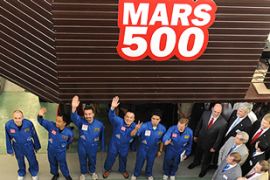Scientists launch mock Mars mission
International researchers in Moscow begin 520-day simulated mission to Red Planet.

But the European Space Agency said it would be at least 30 years before humans could actually go to Mars, and said it would take up to nine months each way to reach it.
Yuri Karash, a former cosmonaut and space analyst based in Moscow, told Al Jazeera: “The history of cosmonautics shows how important it is to have good, harmonious relations among all crew members travelling to space.
“Of course, the most important condition is that people selected for this kind of mission are highly-motivated and they know how to do away with the comforts they are used to on Earth,” he said.
Karash said: “They know they have to face all kinds of difficulties and complications on such a hazardous mission. Some of them know they might not return alive, but still they are going for the challenge.”
Harsh conditions
The researchers will face harsh conditions aimed at simulating stress, claustrophobia and fatigue that real astronauts would undergo when travelling through space.
They will communicate with the outside world via the internet – delayed and occasionally disrupted to imitate the effects of space travel.
|
“Each crew member has the right to end the experiment and walk out” Boris Morukov, the mission director |
They will eat canned food similar to that currently offered on the International Space Station and take a shower once every 10 days or so – mimicking space conditions. The crew will also have two days off in a week, except when emergencies are simulated.
The simulation is taking place at a facility comprised of several interconnected modules with a total volume of 550 cubic meters and a separate built-in imitator of the Red Planet’s surface for a mock landing.
Psychologists said such long confinement will put the team under stress as they grow tired of each other.
Well aware of this hazard, crew members equipped themselves accordingly.
“When I was a little boy I asked if I could go to Mars and I am now proud that I am part of making this one day happen,” French participant Romain Charles said, adding that he will bring along his guitar for entertainment.
Making history
Boris Morukov, the mission director, said the experiment could be disrupted for medical or technical reasons or a personal demand from one of the participants.
“Each crew member has the right to end the experiment and walk out,” he told a news conference.
But the crew spoke about their mission with pride and said they were confident of success.
Diego Urbina, the Italian-Colombian member, said the mission would mean “accomplishing dreams about the future, doing something that no human has done before”.
The organisers said each crew member will be paid about $97,000 for taking part in the experiment.